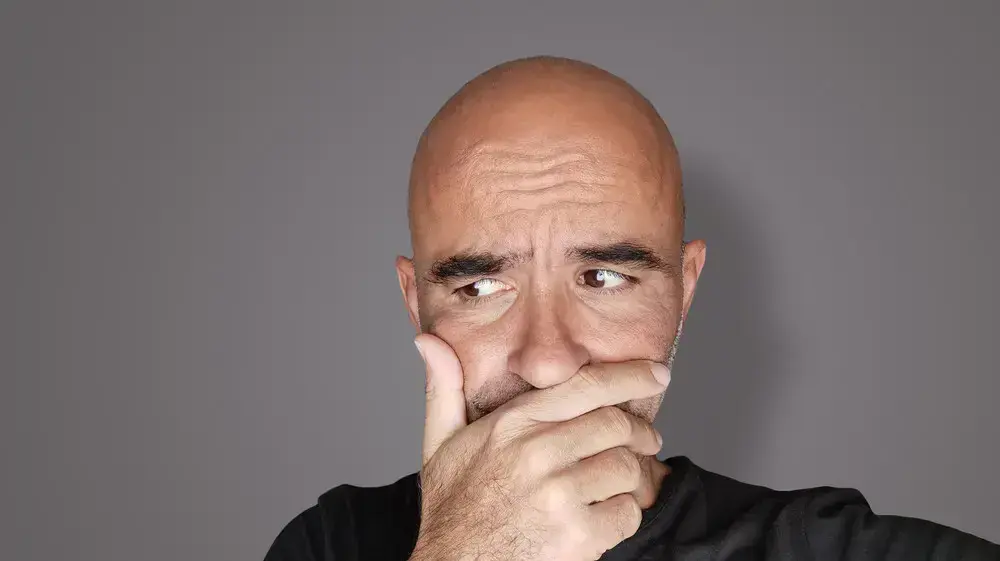health
psychology
Behavioral Sciences
What a shame!
Why are we so afraid of embarrassment?
There's the embarrassing incident you tell about with a smile to friends, and there's the one you dare not tell anyone because your stomach just turns over thinking about it.
Familiar?
So we must talk about this embarrassment
Tags
embarrassment
shame
psychology
Or Yanir
Friday, 23 April 2021, 07:47 Updated: 07:49
Share on Facebook
Share on WhatsApp
Share on general
Share on general
Share on Twitter
Share on Email
0 comments
What is the role of this strange emotion?
Embarrassed man (Photo: ShutterStock)
Remember that time when in the middle of a presentation you were asked a question that you really should have known to answer, but the answer just ran out of your head?
Or the first time you met your spouse's parents and did not understand why they were staring at you strangely until you found out you had sweat stains on your back?
Before you continue reading, try to remember an embarrassing event that happened to you, but not that you automatically pull out on a formation day when you need to tell about an embarrassing thing, the one that really embarrassed you and you did not tell anyone about it.
Why do we actually experience embarrassment, and what is the role of this strange emotion?
More on Walla!
9 signs that you think too much, and the way to stop it
To the full article
Embarrassment is a relatively easy emotion to evoke in people.
It is a complex emotion with physical and physiological characteristics (e.g. blushing and softening of the gaze), and although embarrassment is a relative of shame and guilt, there are differences in the source of the emotion and its role.
Like any emotion, it has positive and negative sides - it can help us build and strengthen social bonds, but it can also prevent us from trying and doing things, digging into our memory and continuing to influence us even years after the embarrassing thing happened.
More in the behavioral sciences:
Mid-life: Why does everyone go through a crisis at 40?
Why do we not like to be told what to do?
We've been waiting so long to get back to routine, so why is it scaring us now?
Do not compromise on unsatisfying sex life: this will improve performance
We experience embarrassment when we do something that is perceived as socially improper, similar to guilt and shame. To describe these three emotions in a simplistic way, guilt is an emotion experienced when we act contrary to our values, whether someone has seen us and knows about it or not; Shame is an emotion experienced when we do something that goes against our values and thinks what another person would think of what we did; Embarrassment is an emotion that is experienced when we do something that goes against social norms - but not necessarily contrary to our values - and we know that another person is aware of it.
You can think of it this way, guilt is what we will feel if we take candy from a small child, shame is what we will feel when we think what our mother would think of us taking candy from a small child, and embarrassment is what we will feel when a small child points at us in the street if we went out in pajamas.
That is, guilt and shame are related to our values while embarrassment is related to social norms, especially of the social group to which we belong or want to belong, and necessarily related to another person who knows about what we have done (or we think another person knows about it).
Embarrassment also has benefits
Belonging to a social group has many benefits, the basis of which is survival.
Although today we are not really dependent on a friend or girlfriend who will save us from predators when we go hunting, loneliness and social rejection are strong motivations for the desire to belong to a group.
Because of this, most people do not want to violate (at least unconsciously) the social norms of the group to which they belong, but it still happens sometimes, and when it does we are in a complex situation - violating the social norm can lead to social rejection, a situation we want to avoid. Therefore, we must take corrective action, a kind of damage control.
This is where the embarrassment comes into play and signals to the world "Hey, Suri, I did not mean to do this!".
The embarrassment signals to the world "Suri, I did not mean to do that!".
Embarrassed woman (Photo: ShutterStock)
Various studies that have been done demonstrate the social benefits of presenting embarrassment. A study done at the University of California showed that people who tended to express greater embarrassment while describing embarrassing moments also described themselves as more social, more generous and more kind. Not only did they describe themselves as such, a follow-up experiment in the study found that those who were more easily embarrassed were actually found to be more generous when asked to share lottery tickets with strangers. Another study by the same group of researchers showed that when people show signs of embarrassment they are perceived as more trustworthy in the eyes of others. So while embarrassment is not a pleasant feeling, it has a contribution and social benefits.
Despite this, and although embarrassment is clearly associated with a social group, not all groups are born equal, and the benefits of embarrassment depend on who exactly sees us.
A study published in 2011 found that people experience more embarrassment when they violate a social norm in front of members of their social group than in front of members of a social group to which they do not belong, especially if the same group is perceived by them as having a lower status.
If we add the points, we can understand that embarrassment has an important social role that helps us correct negative social interactions within the group and increase the chance that we will be forgiven, but at the same time the lack of embarrassment will increase the gaps, especially between different and competing social groups.
The desire to avoid embarrassment can endanger us
Beyond the ability of embarrassment to help us correct social situations or increase disparities, embarrassment can also have other negative aspects that have concrete effects on our lives.
Because it is an unpleasant emotion, we try to avoid it naturally, and sometimes this experience can lead to irrational behaviors and actually harm our quality of life and health.
For example, a study conducted at Duke University in 2006 found that the embarrassment sometimes involved in buying condoms can cause people - especially teens - to give up and put themselves at risk for sexually transmitted diseases or unwanted pregnancies, just to avoid embarrassment.
This is one example, but men may give up prostate tests, women may give up mammograms and large sections of the population may give up the use of hearing aids, for example, just to avoid the possibility of embarrassment.
The desire to avoid embarrassment can lead to irrational behaviors (Photo: Giphy)
The desire to avoid embarrassment can also prevent us from asking for advice or help, taking part in social events, going on dates and generally sharing with others the events that happen to us, even though this sharing can bring our sons and others closer.
One of the problems with this kind of irrational behavior is that when we do it, we do not perceive the behavior as irrational.
Why?
Because we are affected by the two main cognitive biases in this context - we suffer from an underestimation of how much others experience embarrassment, and we suffer from an underestimation regarding the question of how much embarrassment can affect us in the future.
So we actually tell ourselves a story that says something along the lines of "it's okay not to do it now because next time I will have no problem doing it," and make our behavior sound completely rational, but guess what happens next.
We're just scared
To deal with embarrassment better, one needs to know it and understand it.
Think again about those awkward moments that I asked you to remember at first, what was it about them that embarrassed you so much?
Embarrassment is, at its core, fear.
Fear of social rejection, fear of looking weird, fear of feeling pathetic, fear of the question (unnecessary most of the time) of what they will think of us.
If we understand embarrassment in this way, it will be a little easier for us to deal with it.
Embarrassment is also an egoistic emotion in the sense that it makes us think we are the center of attention and that everyone around us has nothing better to do than examine our behavior and rate it.
What’s more, we imagine how others will judge us, and a significant portion of the time act on that similarity, and there is a significant problem with that - we judge ourselves more severely than others judge us, and this is supported by the results of dozens of studies.
That is, even if we do something a little weird or unusual, they probably won't take it as seriously as we think they will.
More on Walla!
Why we take things personally and how to stop with it
To the full article
When something embarrassing happens, people have, in general, two coping strategies - ignoring and direct coping.
Ignoring is (mostly) not a good choice because it does not address the situation in any way, and pretending that something did not happen does not change the fact that it did happen.
You may have decided that since there is nothing you can do about it the best is to just pretend it did not happen and move on, but not sure everyone will agree with you.
If these are people you meet on a regular basis, the embarrassing situation can come to mind every time you encounter them (even if they will not mention it) and embarrass you again every time.
Therefore addressing an embarrassing situation and dealing with it directly is a much better strategy.
The common way most people deal with embarrassing situations is through humor.
Note that this is a good coping strategy only if you are the one who did the embarrassing thing and not someone else - your friends will not really appreciate you if you laugh at something embarrassing that happened to them and remind them, but there is a high chance they will appreciate the courage you have to deal directly and take responsibility For the embarrassing social action you just performed, even if it was completely unintentional.
Share on Facebook
Share on WhatsApp
Share on general
Share on general
Share on Twitter
Share on Email
0 comments









